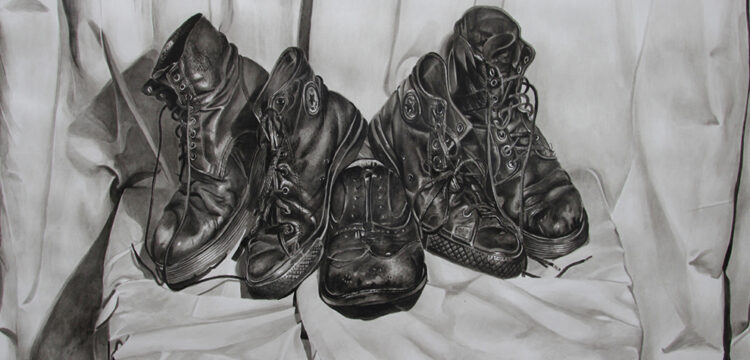Listen, Radical Feminism!
A transcription of Rivolta Femminile group’s self-consciousness sessions during the years 1971 and 1972
Ruth is a collector of writings, a site dedicated to grey literature, unpublished and experimental texts. Conceived by Manuela Pacella, was born from the pleasure of writing and reading. We are very glad to host a text each month, selected from one of the sections of the four-headed Ruth: Yellow Dog, Hungry Ghosts, Free Spirits, Brain New.
This month we chose from Yellow Dog Listen, Radical Feminism! by Anna Cestelli Guidi and Angela Marzullo, originally written in Italian for the presentation of the video by Angela Marzullo at Galleria Nazionale d’Arte Moderna e Contemporanea for WOOJ – Women Out of Joint: il femminismo è la mia festa (28-29-30 September 2018), a festival promoted with IILA (Istituto italo-latinoamericano).
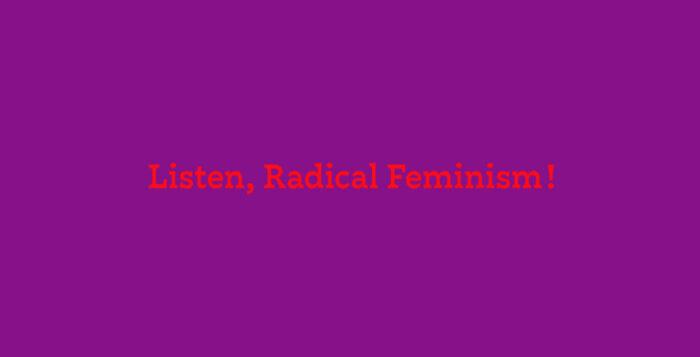
Audio Tape -11.14.1972- A-Side.
Angela Marzullo’s latest video, Listen, Radical Feminism! is the transcription and translation into English of the recording of a self-consciousness session of the Rivolta Femminile (Women’s Revolt) group—dated November 14, 1972, and marked as “speech: vaginal content – cli.”
The video is a visual transposition of a 30-minute group conversation. Unlike the artist’s previous works, which were constructed through an editing process based on a precise narrative line, here the aesthetic is expressed mainly in the choice of the long 30-minute sequence, with a monochrome as the only image/color that uninterrupted accompanies and serves as background for the whole discussion. As such the artist manages to formally visualize the feminist discourse’s radicality, by preserving the integrity of the self-consciousness principle, according to which all subjects are on the same level. Therefore, the video becomes the symbolic frame that supports and reinforces the discourse, avoiding any competition with the image.
Through the use of the monochrome abstraction, through the color symbol of feminism—the intense purple used in the sequence shot, Angela Marzullo creates a timeless dimension that connects the women who are listening today to the women who spoke in the seventies.
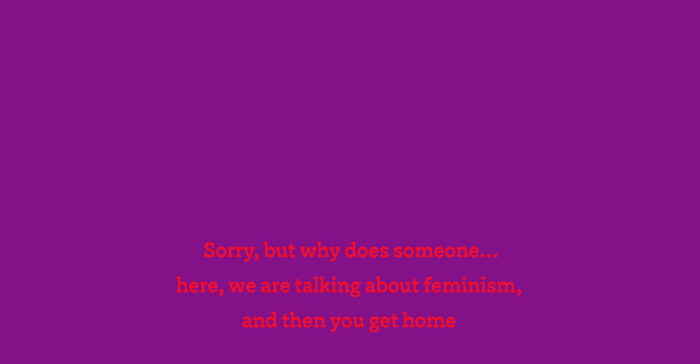
Audio Tape -11.14.1972- A-Side.
The screen vibration is energized by the rhythm of the English subtitles that scroll in red over the purple monochrome, made in a typeface designed by a woman who is also concerned with redesigning writing in order to re-imagine the world, in a feminist perspective. Normally used as a necessary integration to the comprehension of a text in a different language, the subtitle here becomes the core of the work, that through the English translation makes the understanding of the word possible, and therefore its urgent and intimate meaning becomes accessible to an audience that is not only Italian.
Listen, Radical Feminism! is the video maker’s first work dealing with audio material from a 40-hour archive of the recordings by the Rivolta Femminile group’s self-consciousness sessions during the years 1971 and 1972. A “wild”archive, which has never yet been institutionalized, received as a gift by Angela Marzullo on the basis of a relationship of trust that reflects the act of entrustment theorized by Italian feminism as a transmission method of intergenerational knowledge for the creation of an autonomous feminist culture.
For the artist, the personal responsibility that comes into play with the gesture of entrustment means not only to imagine how to visually translate the audio track, but also how to bring the archive back to light, that is how to bring back to life the words locked inside a temporal and spatial continuum belonging to the transmission of feminist knowledge.
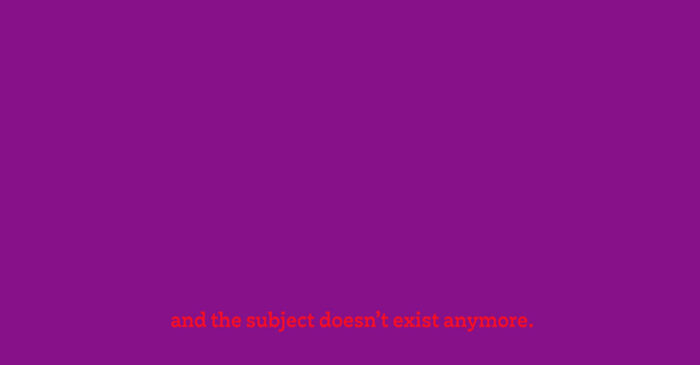
Audio Tape -11.14.1972- A-Side.
Similarly, within the work of the last ten years, Angela Marzullo has breathed new life into the words of critical texts through the voices of her daughters, from Bertold Brecht to Pasolini to Hannah Arendt and ending with the words of Carla Lonzi in the 2014 video Sputiamo su Hegel (Let’s spit on Hegel).
In both cases, it is about the transmission of knowledge from mother to daughter, from woman to woman. The only difference is that while in the past the focus of Angela Marzullo—a woman, artist and mother—was obviously on the feminist education of her daughters—Lucie and Stella—now the space of care opens up to radical feminism, or rather to those revolutionary practices of self-consciousness that laid the foundations for the contemporary discussion of feminism in the 1970s.
For the artist, it is now a matter of figuring out how to transmit that precise knowledge—which is particular, that is, of Carla, Marta, Maria Pia, Lina, Marcella, Anna, Giovanna and Cristina whose voices we hear in Listen, Radical Feminism! concerning all of us today as well. In this sense, the responsibility of the artist consists in giving voice to an issue that is inherently common: in the same way as the traditional solidarity between women, as manifested for example in children care—with the same affective intensity, the artist takes care of the memory of women, the archive, a common heritage to be preserved and transmitted to future generations.
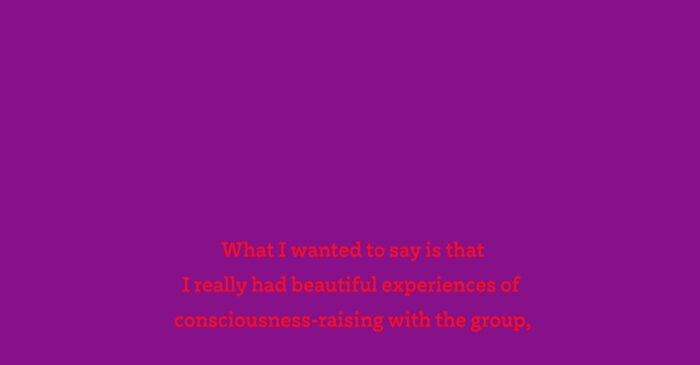
Audio Tape -11.14.1972- A-Side.
In this task, traditionally antithetical concepts such as “care” and “radical” feminism are connected and intertwined by Angela already in the title of the very first step of this project in progress: How to Take Care of Radical Feminism, the special booklet that encapsulates the conversation among three women, namely Dora Stiefelmeier, Anna Cestelli Guidi and Angela Marzullo, that took place in Rome in 2015, provoking a creative tension that is articulated through different formats and expressive means, at different times and moments. A long-term project developing collectively over time in the creation of only women small research groups, implementing that separatist thinking, which perhaps even today can be measured as a subversive practice against established knowledge. Because, as Carla Lonzi writes, among the initiators of the groups of self-consciousness and Rivolta Femminile, “by becoming aware of cultural conditioning, of those we don’t know, don’t even imagine we have, we might discover something essential which can alter meaning within ourselves, in relationships and life. As one goes deeper into oppression, the sense of liberation becomes more interior. For this reason, awareness is the only way, otherwise you risk to fight for a liberation that then turns out to be external, apparent—for an illusory path.”


